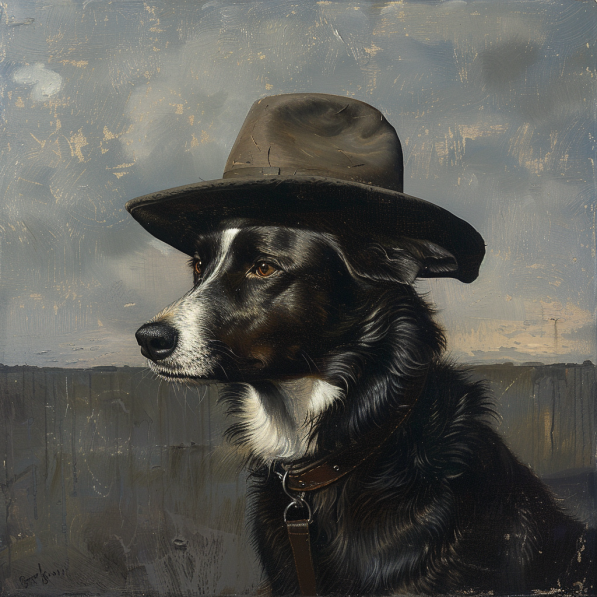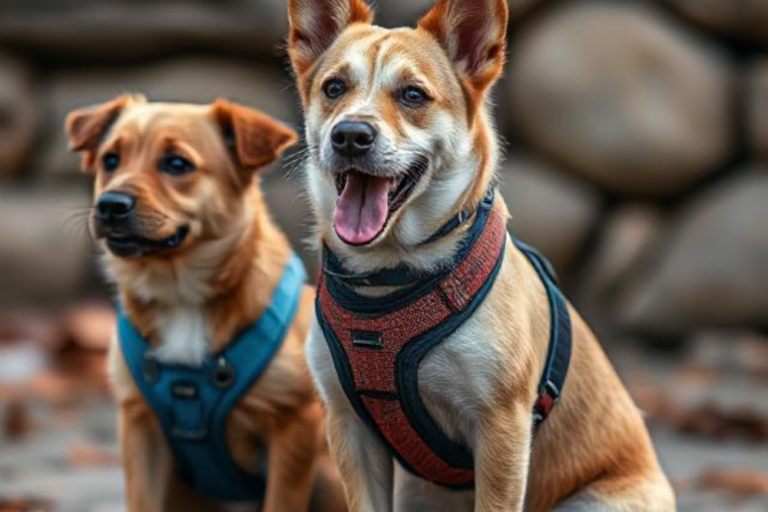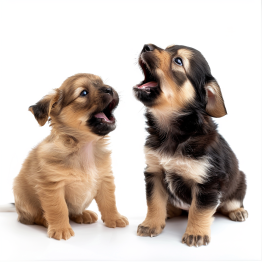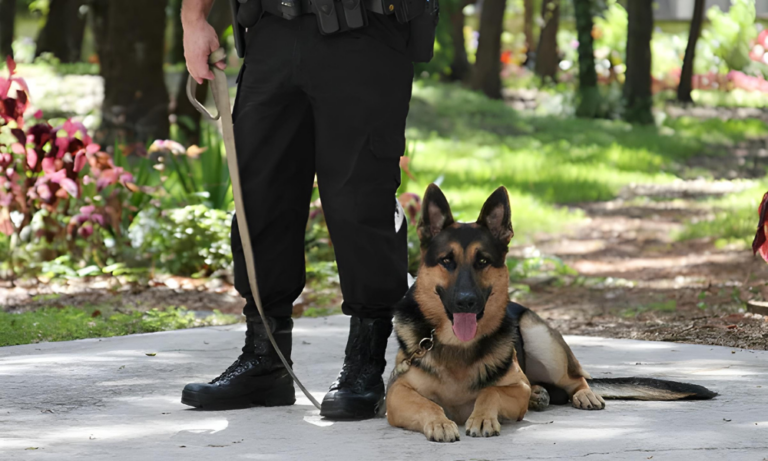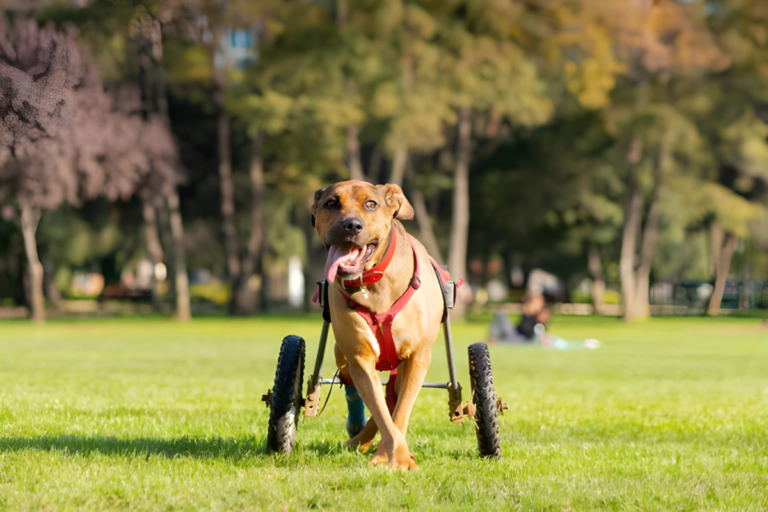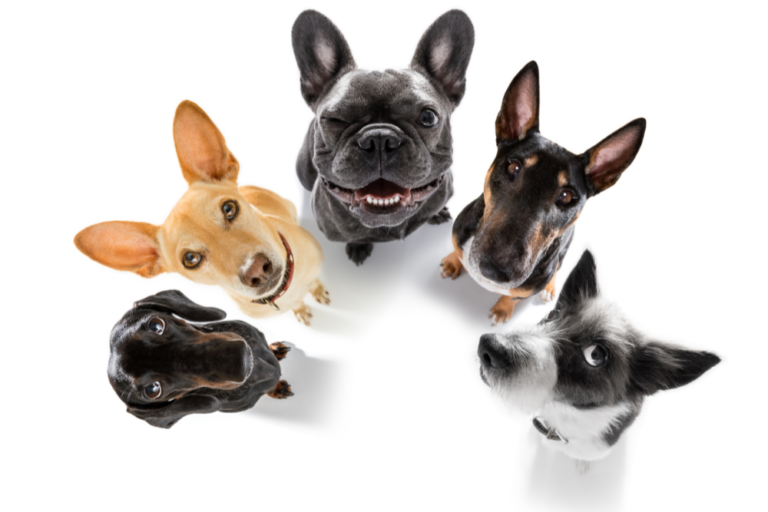Puppy Training
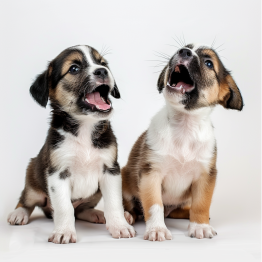
Puppy Training How To
Congrats on your new puppy! Gather some honest puppy training info and how to tips on this page.
Geek the behavior of your favorite pup by watching interaction with litter mates;)
Honest Puppy Training Information
Surprisingly.. Puppy training actually begins within the litter! From about 3 weeks of age on, these newbies begin to explore their surroundings. By action and either negative, or positive response, acceptable dog behavior is learned.
This is natures way and interaction with Mom and littermates also begins to establish hierarchy as common in most all social animal packs.
TIP: Geek your new puppy! It’s a great idea whenever possible to visit your breeder and watch how the pups interact socially.
Here you should look for a sociable pup to increase your odds for a well tempered dog. Choosing a pup who cowers or wanders off on its own, seems to dominate and bully litter mates may indicate both a timid or hard headed puppy.

Fast forward..
Four or 5-weeks and your new puppy is home! How exciting and you are so lucky:) With exception to what your puppy has learned within the litter, its mind is like a blank canvas. A dry sponge so to speak and ready to soak up everything you will teach them. Every newly homed puppy begins a grand adventure. While you may have been through puppy training time and time again, it’s back to square one, what fun!
These first few days your puppy may be scared, timid and anxious due to the recent separation from its litter. During these initial stages I personally like to stay transparent with puppy training and let my new little joy acclimate. Providing in minimum, a nice cozy den/ puppy crate, some new soft toys, food, water and lots of love.
TIP: Prior to homing your new puppy you may leave an old towel, pair of jeans or article of clothing with the breeder or seller if possible. Bring this back with your puppy, or bring home a blanket or toy from the seller. This will help immensely in the case of any separation anxiety the first few days.
Keep a watchful eye during this period of puppy training for potty breaks and try your best to avoid accidents. If you notice any changes in playful behavior, such as stopping play to sniff, quickly pick up your pup and bring it outside to a designated bathroom area. This area serves a special purpose and you should bring your puppy to it numerous times a day, before bed and upon awakening. It’s never too soon to begin this potty training process.
Basics
Now in brief let’s discuss the rest of our puppy training process. Each section here will soon link to a full article on the specific topic. Remember always to keep things positive!
At times you may get overwhelmed and very frustrated with your new puppy, this is normal. Yet yelling at and punishing a young puppy can lead to a timid or fearful dog. Your puppy will have accidents! Your puppy will chew on things! Your puppy may bark, whine and be disruptive! If you’re suffering sleepless nights with a noisy puppy, our tips to stop puppy barking may give you some additional insight and realization, you’re not alone.
Don’t forget that much of these frustrations are due to normal puppy behavior. The best way to address these annoyances is to keep a watchful eye, distract and re direct while staying patient and being persistent.
Puppy Training With a Crate or Den
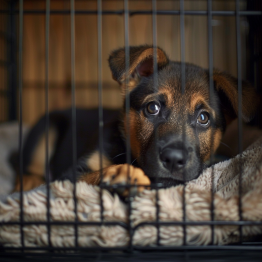
The crate should always be a pleasant retreat and safe place for a dog.
Instinctively, dogs are denning animals. By providing a crate of appropriate size and using it properly, you’re fulfilling the natural desire of your dog to den. A dog crate crate should never be used as punishment!
Yes, an occasional time out is OK yet to scold a dog for an accident and lock it in its crate is NOT. A dog crate will also provide a safe, comfortable quiet place for your pup to rest. Also, this is an invaluable tool for potty training.
The first few nights expect whining and restlessness, maybe even for a week or two. It’s common for a puppy to whine and cry and imperative that you ignore this.
Gradually and once your puppy understands it is safe, becomes accustom to your schedule and its new surroundings, the noise will end.. I promise.
Potty Training
Potty training is more an understanding than a process. For the first few weeks of life dogs eliminate via the stimulation of them mother. At about three or 4-weeks they will venture away from their littermates to eliminate. Nothing has changed within your home. It’s all just fine as far as a puppy is concerned to find a nice spot and eliminate. Typically, as long as it’s away from where it eats or sleeps.
Three keys to puppy training house breaking are a dog crate, a watchful eye and numerous trips to the bathroom area. Here we will use a “command” and praise our pups when they “finish”.. or whatever command you choose;) Accidents will and do occur so get used to it. However, by keeping a very watchful eye they can be kept to a minimum. If you sweep your pup up and take it to the bathroom area the moment their behavior changes and they start to sniff, you can almost avoid all accidents.
With repetition and without warning, like a miracle your young dog will know where the bathroom is! This will be achieved with time and no two dogs are the same. Never rub your dogs nose in an accident or scold it after the fact. Over time and as your pup matures, their bladder control will increase and bathroom breaks will be fewer.
TIP: It is agreed upon by most that a dog can hold their urine for one hour with every month of age. This is a great rule of thumb.
Bad Behavior..
Redirect and praise, “good chewing” 🙂
Is actually normal puppy behavior! Of course things like chewing, barking, foraging through trash and other activities, while normal to a dog is a problem for us. Like everything else with puppy training, a watchful eye and catching your puppy in the act is key to developing an understanding of what is acceptable. Don’t miss our dog behavior training training for more help with specific behavioral issues.
While I like to keep things positive certain situations like catching them “in the act” require a stern command such as “NO!”, or “BAD!”. Next we redirect the pup and give positive praises for “acceptable” behavior. The simple contradiction of tone and body language will soon be understood by your pup.
Socialization
I like to socialize, socialize, socialize. If your puppy is a toy or small breed, be sure to pass it around to friends and family. Just be sure they are aware how to properly handle a puppy as serious injury and broken bones are common with dropped dogs, especially toy breeds. When socializing larger breeds, encourage interaction with everyone you meet keeping a calm, confident attitude and body language at all times.
Socializing with other dogs and animals is also important from an early age and will result in a friendly, trustworthy adult dog. Just keep in mind it is best to hold off on socializing with other dogs until your vaccination protocol is complete, about three or four months of age. There a tons of nasty viruses and parasites that can be transmitted to an unvaccinated puppy, especially at dog parks.
Puppy Training Obedience
Obedience training can begin once your pup has settled in. But keep in mind that the attention span of a young dog is minimal, maybe 5 to 10-minutes tops. Two or three short obedience training sessions per day with a young puppy is just about perfect to get them started. Using positive training or clicker dog training with a young puppy will build trust and confidence. Working for praises and rewards is fun and your puppy will want to learn. As with any training, especially puppy training, timing, consistency and repetition is key. Also, to repeat, reapeat and repeat!
To Sum Up Puppy Training
Remember.. Your puppy must grow accustom to new surroundings and your schedule before you can expect any routine. Through normal puppy behavior they learn via action and response what is right and what is wrong. Temperament can vary by breed, it’ good to research yours so you are prepared. Puppy training begins The day you bring your puppy home and both good and bad behavior is learned so don’t get frustrated. Potty training, basic obedience, teething and chewing are resolved when you catch, redirect, praise desired behavior and repeat. A watchful eye, repetition and patience will condition desired behavior guaranteed. And lastly, with a safe place or den, activity, praises and love, your puppy will thrive.. you will too:)

